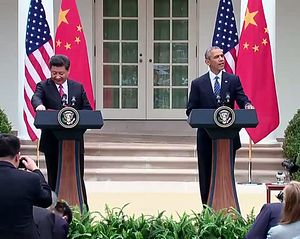It’s Friday, and that means it’s time for your weekly round-up of China links…
First, some final pieces to wrap-up President Xi Jinping’s visit to the United States.
Bonnie Glaser of CSIS, writing for the Lowy Interpreter, points out that one of the most important outcomes of the Obama-Xi summit has gone largely overlooked: the new annex governing “Rules of Behavior for Safety of Air-to-Air Encounters.” Glaser points out the importance of this “landmark achievement,” while also pointing out where there is room for improvement in the text.
Over at the Brookings Institution, Richard Gowan takes a closer look at China’s new commitments to the UN peacekeeping force, which were announced during Xi’s address at the UN. It’s a major change for China – and one the Obama administration welcomes.
Meanwhile, in case you missed it, Graham Webster has a list of five other developments from Xi’s visit that went largely overlooked — starting with the fact that China has accepted an invitation to join the 2016 RIMPAC exercises.
Moving away from Xi’s visit: Bloomberg has an update to the series of bombings that killed ten people in Guangxi Province this week. Xinhua is now reporting that the suspect, Wei Yinyong, was killed in the explosions. His motive for sending 17 bombs to various public buildings was a dispute “over the operations of a local quarry” where Wei worked. The details of the dispute remain unclear. Xinhua also revised the death toll to ten, up from previous reports of seven.
Over at Foreign Policy, Christina Larson profiles Zhao Bowen, the CEO of a company doing genetic research – despite dropping out of high school. Zhao is part of a larger trend in China, where, as Larson puts it, “some of the best and the brightest are moving out of the traditional system in favor of private or semiprivate research.” That shift toward privatization – and less state control – could be just what China needs to become an innovation powerhouse. It won’t be an easy transition, but Zhao and others are determined to try.
Finally, China Power readers probably know that China’s National Day on October 1 kicks off a week-long national holiday – and a major tourism boom. But where are China’s tourists going?
Forbes notes that a record-high number of Chinese – four million – planned to travel abroad for the vacation period. Despite tensions between Tokyo and Beijing, Japan is a popular destination. Hong Kong, on the other hand, has seen a sharp decrease in the number of tourists from mainland China in the wake of its pro-democracy protests last year.
Xinhua, meanwhile, has a piece on tourism within China, particularly city dwellers who trek to the countryside for a taste of the agrarian life.

































